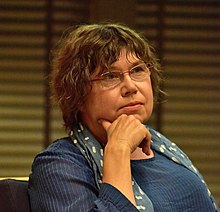Barbara Engelking
Barbara Teresa Engelking (born April 22, 1962 in Warsaw , Poland) is a Polish sociologist and psychologist who is the author of several books on the Holocaust and the founder of the Center for Research into the Holocaust at the Polish Academy of Sciences in Warsaw. Since 2011 she has been a professor at the Institute of Philosophy and Sociology of the Polish Academy of Sciences (IFiS PAN). She is also the chair of the International Auschwitz Council .
biography
Engelking was born in Warsaw and went to school there. In the 1980s, closed Engelking first her degree in sociology with a Bachelor Accounts and began a master -Studies of psychology , which she finished 1,988th Her doctorate took place in 1993 under the direction of Aldona Jawłowska . The title of her dissertation is "On the Ashes: Survivors of the Holocaust" ( Na ła̜ce popiołów: ocaleni z Holocaustu ).
She has been a professor at IFiS PAN since 2011.
From November 2015 until the end of April 2016, Engelking was at the Jack, Joseph and Morton Mandel Center for Advanced Holocaust Studies of the United States Holocaust Memorial Museum through the Ina Levine Invitational Scholar Award .
Engelking was married to Michał Boni , whose name she still bears.
She is the daughter of the mathematician Ryszard Engelking , who also taught at the University of Warsaw .
plant
Engelking has (as of April 2018) published 41 scientific articles in journals and contributed to 13 third-party books. In Germany, she is mainly responsible for the book "Getto warszawskie: przewodnik po nieistniejącym mieście", published in 2001 together with Jacek Leociak (for example: The Warsaw Ghetto. Guide to a Lost City ) and the book "Inconvenient Truths: In 2008, published together with Helga Hirsch . Poland and its relationship with the Jews ”. The Süddeutsche Zeitung wrote about inconvenient truths :
“Helga Hirsch and Barbara Engelking have compiled the most important essays on Polish-Jewish relations that have appeared in the Polish media over the past two decades. Often these triggered violent and important historical debates in Poland "
According to Engelking, he is particularly interested in the “daily challenges and moral dilemmas during the Holocaust”.
During her stay at the US Holocaust Museum in Washington, she analyzed the survival strategies of Warsaw's Polish ghetto residents and designed a map of the hiding places in Warsaw. Engelking also examined the psychological development of the residents over the course of several years. Their project was entitled "Hiding on the Aryan Side in Warsaw, 1940-1944." ( Hiding on the Aryan Side in Warsaw, 1940-1944. )
In her lecture at the annual event held at the United States Holocaust Memorial Museum by Ina Levine Fellows, Engelking looked at dreams as a source for Holocaust research.
Publications (selection)
- “Zagłada i pamięć” ( Holocaust and Memories ) IFiS PAN 1994.
- "Holocaust and Memory", Leicester Univ. Press; 2001. ISBN 0-7185-0159-4 .
- Barbara Engelking & Jacek Leociak: "Ghetto warszawskie: przewodnik po nieistniejącym mieście" ( The Warsaw Ghetto. Guide to the Lost City ) IFiS PAN 2001.
- "The Warsaw ghetto: a guide to the perished city", Yale Univ. Press 2009. ISBN 978-0-300-11234-4 .
- "" Szanowny panie gistapo ": donosy do władz niemieckich w Warszawie i okolicach w latach 1940-1941" ( "Dear Mr. Gestapo". Denunciations to the German authorities in Warsaw and the surrounding area 1940-1941 ), IFiS PAN 2003
- "Inconvenient truths - Poland and its relationship to the Jews", Suhrkamp 2008. ISBN 978-3-518-12561-8 .
- “Jest taki piękny słoneczny dzień… Losy Żydów szukających ratunku na wsi polskiej 1942–1945” ( Today is a beautiful Sunday… The fate of Jews looking for holfe in the Polish countryside ), Stowarzyszenie Centrum Badań nad Zagładą Żydów 2011 . 932202-1-1 .
Web links
Individual evidence
- ↑ prof. dr got Barbara Teresa Engelking (Engelking Bonuses) , nauka-polska.pl. Retrieved April 12, 2018.
- ↑ a b c Ina Levine Invitational Scholar Dr. Barbara Engelking , United States Holocaust Memorial Museum website. Retrieved April 12, 2018.
- ↑ Barbara Engelking on the website of the Center for Holocaust Research. Retrieved April 12, 2018.
- ↑ Perlentaucher : Barbara Engelking, Helga Hirsch: Inconvenient Truths - Poland and its relationship to the Jews . Retrieved April 12, 2018.
- ^ The Ina Levine Annual Lecture , United States Holocaust Memorial Museum website. Retrieved April 12, 2018.
| personal data | |
|---|---|
| SURNAME | Engelking, Barbara |
| ALTERNATIVE NAMES | Engelking, Barbara Teresa; Engelking Bonuses, Barbara Teresa |
| BRIEF DESCRIPTION | Polish Holocaust researcher and university professor |
| DATE OF BIRTH | April 22, 1962 |
| PLACE OF BIRTH | Warsaw , Poland |
